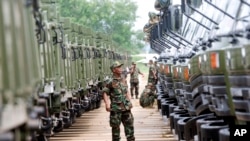Cambodia held annual joint military exercises with China on Thursday amid increasingly tight-knit relations between the two countries.
The Dragon Gold exercises were held in Kampot province’s Chumkiri district on land controlled by Infantry Brigade 70, an elite reserve force for Prime Minister Hun Sen’s bodyguard unit.
The joint exercises included tanks, armored personnel carriers, combat helicopters, howitzers, “surveillance technologies” and methods of defending against biological weapons, according to the defense ministry.
Previous Dragon Gold exercises were held in 2016 and 2018 after Cambodia-US military exercises, known as Angkor Sentinel, were halted amid worsening relations with the west over Hun Sen’s human rights record.
Chhun Socheat, a defense ministry spokesman, said the drills were aimed at improving the “comprehensive and strategic friendship” between the two militaries.
China last year pledged some $100 million in military aid to Cambodia.
Tea Banh, the defense minister, Vong Pisen, commander-in-chief, and Hun Manet, head of the army, have all visited China since October.
Despite facing no substantial external threats, Cambodia argues it must increase military capacity to defend its borders, pointing to the National Police’s 2018 annual report, which recorded 146 violations of Cambodia’s airspace last year.
Vietnamese President Nguyen Phu Trong visited Cambodia last month, meeting King Norodom Sihamoni and Hun Sen.
It was unclear if the Communist Party chief discussed the border issues with Cambodian leaders, but in a joint communiqué to conclude his visit both countries came to an agreement to “settle the emerging issues between the two countries by peaceful means.”
Cambodian political analyst Lao Monghay said the Vietnamese leader’s visit was part of Hanoi’s efforts to retain its traditional influence in the face of China’s rise.
“Vietnam is trapped in its own geography,” Monghay said in reference to China’s claims in the South China Sea and Beijing’s bid to spread its influence across Laos and Cambodia.
“Vietnam makes its best attempt to stop Cambodia from falling into the hands of China like it was during the Khmer Rouge regime. That would impose threats to Vietnam’s national security.”
Allegations by the United States that there were plans by the Chinese government to lobby Cambodian leaders for a Chinese military base in the Kingdom were denied by Phnom Penh.
Socheat of the defense ministry denied the drill was a threat to Cambodia’s neighbors. “We seem to have no significant muscles to flex since we are a small country … It [the drill] is not related to any threats to anyone.”
The Chinese Embassy in Phnom Penh did not respond to request for comment.
Experts say the military drill is a part of China’s grand strategy to shore up its backyard influence in Southeast Asia.
“Southeast Asia used to be a tributary region to the Chinese Empire. The current Chinese leadership has their long-sighted strategy with an ambition to restore their influence in Asia in general and in South East Asia in particular,” Monghay said.
China is also engaging with other Southeast Asian states for similar exercises. China has held a larger annual drill with Malaysia since 2014 in what they call Aman Youi (Peace and Friendship) which was also joined by Thailand, as an observer, last year, when Beijing also hosted inaugural ASEAN-China maritime exercises.
Paul Chambers, a military expert at Thailand’s Naresuan University, said Dragon Gold is part of China’s broader strategy to expand its military reach in Southeast Asia to challenge the existing hegemony of the United States.
“In line with Beijing's goal of transforming Cambodia into a hub of Chinese economic and military influence in Southeast Asia, the drills help to both entrench such military diplomacy and at the same time advertise to Southeast Asia China's close regard for the region,” Chambers told VOA Khmer in an email.
“China is seeking to leverage its drills and military aid as a means of competing militarily with the US in Southeast Asia. The result could be an intensifying arms race between the two countries in the region.”







